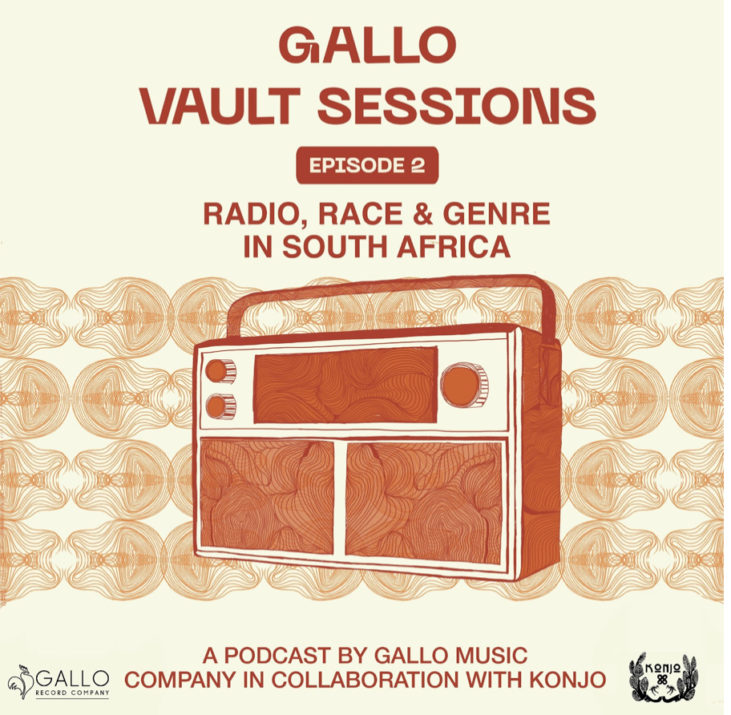
Race, radio and genre are explored in episode 2 of Gallo Vault Sessions, the fascinating music podcast that takes you through the biggest cultural and political moments in South African music. Released a day after Freedom Day, on April 28th, the episode explores the impact the SABC and in particular, Radio Bantu, had in shaping apartheid’s grand separate development vision, and the role music played in that. It also highlights one unintended consequence – how radio drama ‘rescued culture’.
Featuring veteran broadcaster Shado Twala, and legendary musician Sipho ‘Hotstix’ Mabuse, amongst others, the episode touches on Mavuthela, Pharanyana, Percy Sledge, Thomas Chauke, Radio Metro, the role of radio dramas and censorship. Accompanying it is the all-vinyl mix exploring Radio Bantu and beyond, by Vusi Hlatywayo.
Gallo Vault Sessions, a six part series, explores South Africa’s rich and complex musical history through the prism of the longest running independent recording label in Africa, Gallo Music, which houses the largest collection of African music masters in the world.
Harari – a group that was previously banned by the SABC
Episode 2 moves from the launch of Radio Bantu led by the preservationist Hugh Tacey, through to the popularisation of Maskanda and its first major star Phuzushukela; and on to one of Gallo’s first major global hits, the tsaba-tsaba jazz standard Skokiaan covered dozens of times by artists from across the world.
It touches on the impact of US soul on South African music including the seminal Sesotho cover by Jacob Mpharanyana Radebe of Percy Sledge’s ‘Take Time to Know Her’. Sledge in fact broke the cultural boycott to tour South Africa in the 70’s acknowledging that South African audiences had made the song “so great for me here; and I dig you the most for that”.
Furthermore, It explores the threat that the apartheid regime saw in a new wave of musicians that were more politicised and singing in English. As renowned musician, Sipho ‘Hotstix’ Mabuse explains “The SABC would not listen to a black rock ‘n roll band, because it was undesirable for African musicians to be influenced by English; unless we become bad influences of language within radio stations. Certainly for us as a so-called black rock band, we were monitored sternly because most of the music would have been maskandi or mbaqanga or acapella. And so that kind of music they were more comfortable with.”
We also hear from the radio veteran Shado Twala – one of the launch DJs of Radio Metro, the first English speaking radio station marketed towards the black population – on how they were dictated to about what they could play; and how ‘undesirable’ songs were scratched with a nail beyond repair, making it impossible for DJs to play them.
The episode explores one unintended subversion in the Radio Bantu system – original drama; which provided a lifeline of a different sort to audiences. As Dr Sipho Sithole remarks “it rescued our culture. That was radio that was centred in the middle of the community in the middle of the people.”
The series is narrated by Kineta Kunutu, and researched, produced and written by artist, researcher and DJ Zara Julius at KONJO. Gallo Vault Sessions is presented by Gallo Music in collaboration with KONJO. Episode one and two is available on select digital streaming platforms with a new episode launched on the last Thursday of the month, over the next four months.
Engage and follow the story on social media:
#GalloVaultSessions
Twitter: @GalloRecordsSA
Facebook: @gallorecordcompany
Instagram: @gallorecordcompany @k.o.n.j.o @el_metalo
The remaining episodes and their release dates are:
EPISODE 3 (25TH MAY ’22)
The Cultural Project of Whiteness & Afrikanerdom
EPISODE 4 (29TH JUNE ’22)
Talent Scouts & In-House Producers
EPISODE 5 (27TH JULY ’22)
South Africa Abroad / Beyond the Cultural Boycott
EPISODE 6 (24TH AUGUST ’22)
The transition years: 90s and 2000s club scenes
